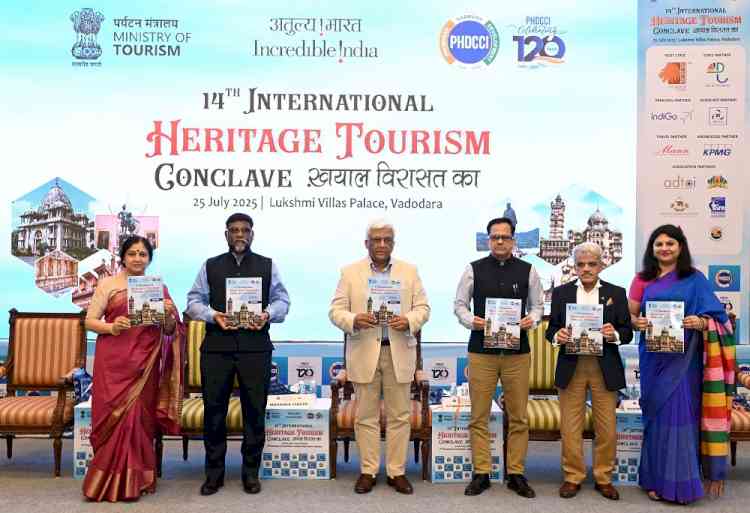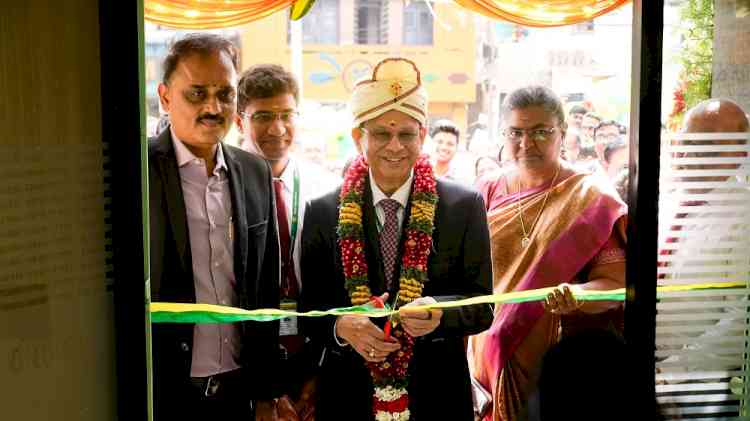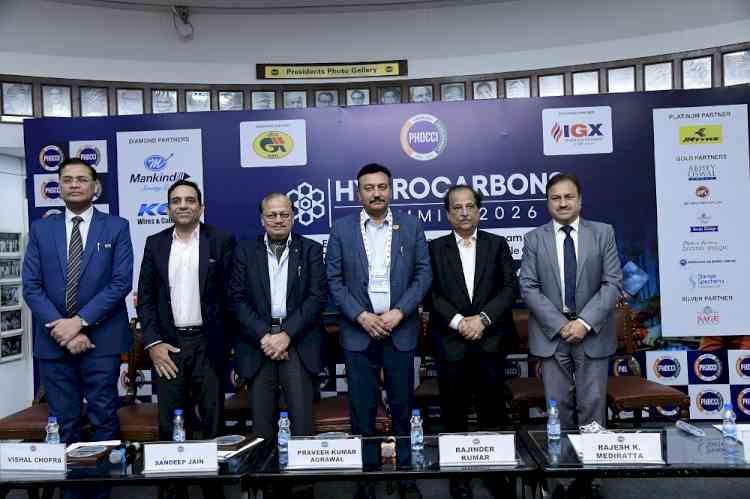PHDCCI’s 14th International Heritage Tourism Conclave calls for community-driven cultural tourism and policy innovation
The grandeur of the Lukshmi Villas Palace provided a regal backdrop to the 14th International Heritage Tourism Conclave organised by the PHD Chamber of Commerce and Industry (PHDCCI) on 25 July 2025 in collaboration with the Ministry of Tourism, Government of India; Gujarat Tourism; Delhi Tourism; IndiGo; and IRCTC.

New Delhi, July 26, 2025: The grandeur of the Lukshmi Villas Palace provided a regal backdrop to the 14th International Heritage Tourism Conclave organised by the PHD Chamber of Commerce and Industry (PHDCCI) on 25 July 2025 in collaboration with the Ministry of Tourism, Government of India; Gujarat Tourism; Delhi Tourism; IndiGo; and IRCTC.
Themed ख़याल विरासत का, the conclave brought together senior government officials, policy-makers, royal family members, diplomats, tourism boards, conservation architects, food historians and industry stakeholders from across the country for a day-long dialogue on leveraging heritage as a tool for economic revitalization, community development and cultural pride.
Inaugurating the conclave, Rajender Kumar (IAS), Secretary – Tourism, Civil Aviation, Devasthanam Management & Pilgrimage, Government of Gujarat, spoke of Gujarat’s extraordinary historical and cultural legacy, highlighting iconic sites such as Dholavira, Lothal, Junagadh and the Girnar hills. He said, “Gujarat’s vision for heritage tourism is rooted in creating impact on the ground. We are not only restoring monuments, but ensuring that local communities benefit directly through jobs, infrastructure and cultural pride. Gujarat Tourism is actively pursuing conservation and adaptive reuse projects across heritage cities, while also promoting traditional crafts and cottage industries through artisan engagement and capacity building.”
Representing the royal legacy of Vadodara, Samarjitsinh Gaekwad, Maharaja of Baroda and Founding Member of the Heritage Tourism Association of Gujarat, remarked, “Vadodara has always been a city that lives its culture – in its art, architecture and music. But heritage survives not through nostalgia, but relevance. If our palaces, traditions and stories are to thrive, they must connect with the next generation, as places of pride, not just the past. As custodians, we welcome platforms like this conclave that bring institutions, government and citizens together to reimagine how heritage can inspire, educate and endure.”
Mohamed Farouk, Regional Director – India Tourism Mumbai, Ministry of Tourism, Government of India, highlighted the Ministry’s commitment through schemes like Swadesh Darshan 2.0 and PRASHAD, adding, “We are creating thematic tourism circuits that connect not only monuments, but also cuisine, crafts, folklore and festivals. Our emphasis is on destination readiness – upgrading infrastructure, ensuring sustainability and building capacity among local guides and communities.”
Delivering the theme address, Rajan Sehgal, Co-Chair – Tourism Committee, PHDCCI, mentioned, “Heritage tourism is not only about preserving monuments, it is about reimagining identity, regenerating local economies and restoring pride among communities. Through this platform, we aim to catalyse policy thinking and public-private partnerships.”
A soulful Saraswati Vandana by students of the Faculty of Performing Arts, Maharaja Sayajirao University of Baroda marked the ceremonial opening of the conclave.
The inaugural session also witnessed the release of the PHDCCI-KPMG Heritage Tourism Report, which underscores the transformative power of public-private partnerships (PPPs) in revitalizing heritage assets.
The first session titled, ‘Vibrant Gujarat model for heritage-led tourism’, was moderated by Ranjit Sinh Parmar, Vice Chairman, Heritage Tourism Association of Gujarat, and featured insights from Khyati Nayak, Head (Niche Tourism), Gujarat Tourism; Sanjeev Joshi, Convenor – Vadodara Chapter, INTACH; and Anil Mulchandani, Author and Travel Writer. The speakers underscored the integration of local communities, preservation of intangible heritage and curated experiences for tourists.
The next session ‘Having a haveli: What it takes to safeguard the living heritage of Shekhawati’ focused on restoration challenges, private ownership and public trust. Moderated by Shruti Nada Poddar, Convenor – Shekhawati Chapter, INTACH, the panel included Angad Deo Mandawa, Whole-time Director, Hotel Castle Mandawa and Urvashi Srivastava, Principal Conservation Architect, Srijan Sanrakshan, who proposed incentives for private owners, craft-based revival efforts and public trust frameworks to restore the Shekhawati legacy.
Culinary tourism took the spotlight in a thought-provoking session chaired by Prof. Pushpesh Pant, Food Historian, Author and Padma Shri awardee. Joined by Chef Manjit Gill, President, Indian Federation of Culinary Associations (IFCA) and Dr. Kurush Dalal, Culinary Anthropologist, Archaeologist and Historian, the panel questioned the limited international representation of India’s culinary diversity. The speakers urged that food should be used not just as sustenance, but as a powerful cultural artefact that connects travelers to India’s soul.
Complementing this discussion, guests were served a traditional Gujarati lunch titled, ‘Bapor nu Bhojan’, curated by Chef Pritesh Raut. Each dish was accompanied by an origin note explaining its historical and cultural context, transforming the meal into a storytelling experience.
The case study ‘Champaner-Pavagadh: Reviving a Forgotten Capital’, led by Dr. Amita Sinha, Professor – Department of Architecture, Planning and Design, IIT (BHU) Varanasi, presented a case for repositioning this under-visited UNESCO site through community-based tourism, interpretation planning and livelihood integration.
The session ‘Women as custodians of culture’, hosted by Shalini S. Sharma, Assistant Secretary General, PHDCCI, featured Her Highness Radhikaraje Gaekwad, Maharani of Baroda and Her Highness Kadambaridevi Jadeja, Maharani of Rajkot. The dialogue shed light on the indispensable role of women in preserving crafts, oral traditions and regional hospitality practices. The speakers urged greater visibility for women-led tourism enterprises and called for a dedicated platform for women heritage leaders.
Architecture took centre stage in the session, ‘Beyond aesthetics – Architecture as a tourism narrative’, moderated by Dr. Bhawana Vasudeva, Head – Department of Architecture, Maharaja Sayajirao University of Baroda. Experts including Dr. Alka Pande, Art Consultant and Curator; Anjchita B. Nair, CEO and Co-Founder, Cultre; Priya Kapoor, Founder Director, International Heritage Conservation; and Vijay Kamalakara, Founder & CEO, Storytrails, called for the use of 3D reconstruction technology, adaptive reuse for cultural centres and improved accessibility to historic sites.
The session, ‘Wheels of time: Heritage transport as living history’ was moderated by Aalap Bansal, Partner, KPMG India and featured Tarun Thakral, Founder & Managing Trustee, Heritage Transport Museum and Madan Mohan, Founder & Managing Trustee, 21 Gun Salute Heritage & Cultural Trust. The speakers presented case studies on how vintage vehicles can become experiential tourism products and proposed restoration grants and public engagement models to preserve India’s legacy in mobility.
Over 25 B2B meetings were held between tourism boards, hospitality leaders, travel operators and cultural entrepreneurs to foster cross-sector collaboration and business development.
A curated showcase of contemporary art with award-winning artists from Delhi, reflecting on Indian identity in a global context through visual interpretations of culture, colour and heritage. The day concluded with a guided Heritage Walk of the Lukshmi Villas Palace.



 City Air News
City Air News 










